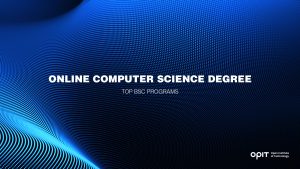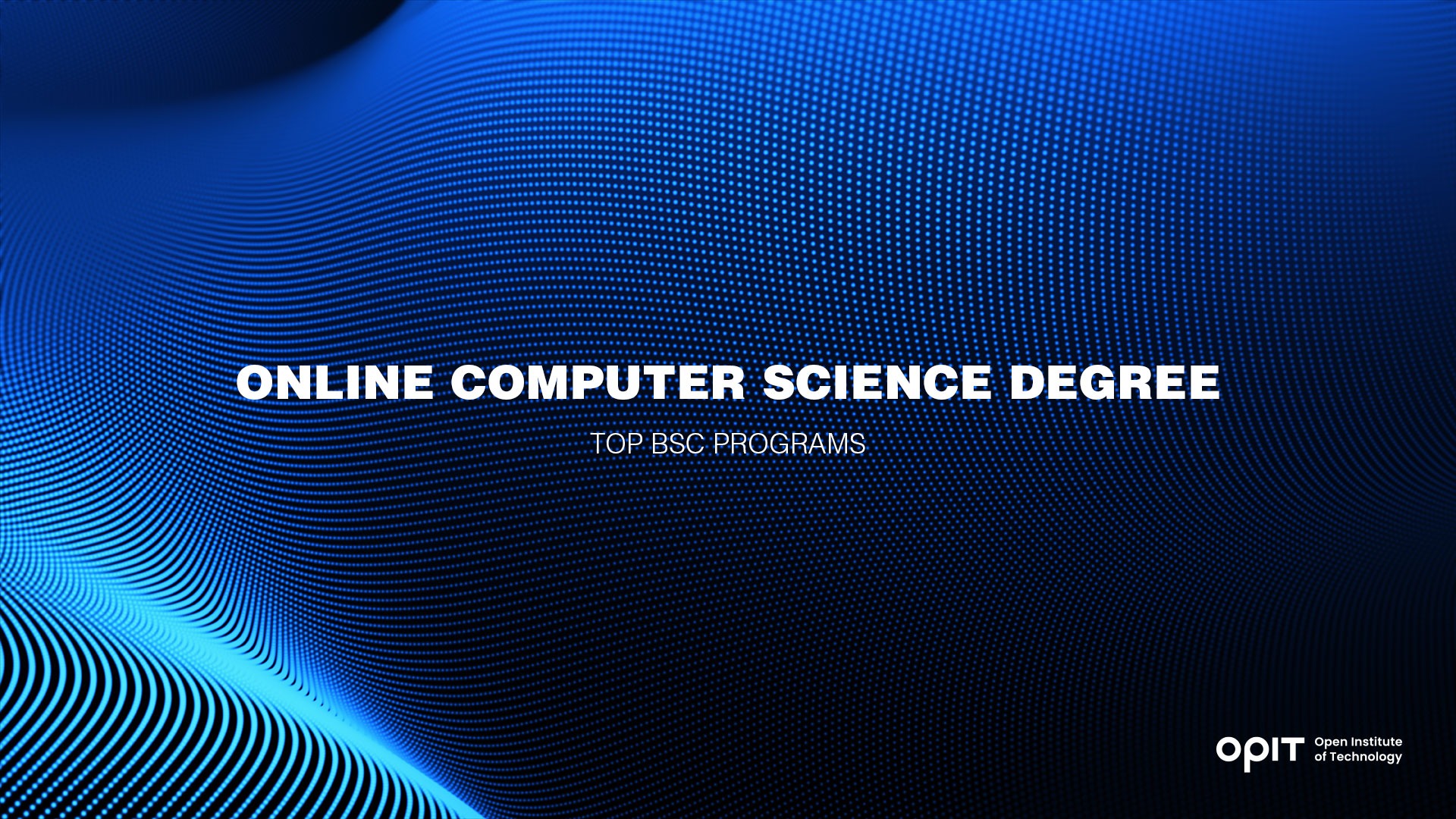With the high demand for computer science experts, it’s no wonder that related professions count among the best-paid jobs worldwide. If this career path sounds exciting to you, enlisting in an online computer science degree program would be the best choice.
Explore our list of suggestions of the top BSc programs in Europe and pick the one that looks like the ideal option based on your interests and goals.
Factors to Consider When Choosing an Online Computer Science Degree Program
The key factors to take into account when weighing up your MSc in Computer Science options include:
- University accreditation
- Program curriculum
- Schedule flexibility and studying format
- University faculty and student/career support
- Expenses and scholarship/financial aid possibilities
Top Online BSc Computer Science Bachelor Programs
International University of Applied Sciences
Description
The BSc Computer Science online program from the International University of Applied Sciences (IU) offers a thorough education in the field. The program includes introductory lessons in mathematics and programming, as well as specialized modules for computer science, software development, and IT security.
Key Features
- Full or part-time studying models
- Accredited program
- Recognition of previous education and experience
- Full studying flexibility
Requirements and Application
You’ll need a higher subject-related education and secondary school diploma to apply for this program. Some applicants may need to take an entrance examination. English proficiency is necessary with one of the following certificates as proof:
- Level 6 on IELTS
- 80 points on TOEFL
- Grade B Cambridge Certificate
- 95 points on Duolingo
Career Prospects
The degree from this program will open numerous career opportunities, including:
- Software developer
- Business analyst
- Project manager in software development
University of London
Description
The online computer science degree from the University of London gives you an opportunity to study with leading experts and researchers. You’ll learn high-demand skills with a particular focus on problem-solving and practical application. The program offers seven specializations in areas like machine learning, mobile and game development, and AI.
Key Features
- Study full or part-time
- Accredited program
- Performance-based or direct admission
- Flexible studying schedule
Requirements and Application
When you apply for this program, you’ll either be accepted directly based on previous academic achievements or based on previous experience in the field. Choosing the application path won’t be necessary: The institution will automatically transfer your application on the performance-based path if you lack the required prior education.
You may need to pass several exams, including a mathematics, programming, and English proficiency test.
Career Prospects
This program will help you build a strong portfolio for job applications. You can also access the university’s career service for support in your future career.
Saarland University
Description
Enrolling in the computer science bachelor degree online program from Saarland University provides access to leading tech authorities in Germany and Europe. The Saarland Informatics Campus collaborates with reputable institutions like the German Research Center for Artificial Intelligence, the Cluster for Multimodal Computing and Interaction, and the renowned Max Planck Institute.
Key Features
- Full or part-time study available
- Accredited program
- No tuition fees
- Flexibility – study at your own pace
Requirements and Application
The basic application requirement for this program will be a school certificate. The certificate must be recognizable as a qualification for university enrollment in Germany. Apart from that, you’ll need to prove your English proficiency and provide one of the following:
- Pass an aptitude test
- Provide proof of participation in an international Olympiad in mathematics, computer science, or science
- Complete an entrance test in interview form
Career Prospects
The cooperation between Saarland University and high-tech institutions gives you as a student the opportunity to interact with leading employers in the computer science field. The university also offers particular support for entrepreneurs.
Check out OPIT degrees
-
Career aligned
-
Fully Online
-
EU-accredited institution
Comparison of Top Online Computer Science Degree Programs
Curriculum and Course Offerings
The first two modules of each program on our list feature introductory courses in mathematics, computer science, web app development, and programming. At this stage, the curricula will have slight differences in additional courses:
- IU: Introduction to Academic Work, Intercultural and Ethical Decision-Making, Collaborative Work, Statistics, and programming in Java environments
- University of London: Software projects and web applications
- Saarland University: Perspectives in Computer Science, System Architecture, and Language Course
In module three, the programs will start differing significantly:
- IU: Focus on database management, computer networks, and SQL programming
- University of London: Specialization modules and a software development individual project
- Saarland University: The basics of theoretical computer science, algorithms, and data structure
The fourth module is where the three curricula diverge completely, focusing on different stages of computer science expertise:
- IU: Theoretical computer science, Python programming, and two projects – IT services and software engineering
- University of London: Introduction to programming, advanced mathematics, computer science fundamentals, data structures, and algorithms
- Saarland University: Concurrent programming, big data, a core lecture, plus a seminar project
In the fifth module, the IU and Saarland University programs become more closely defined, while the University of London explores the essential components of computer science in more detail:
- IU: Cryptography, Introduction to Data Protection and IT Security, two electives (out of nine available), and a seminar on computer science current topics
- University of London: Advanced programming (data, graphics, and object-oriented), software design, networking, databases, cybersecurity, and projects in Agile software development
- Saarland University: Machine learning, two core lectures (out of 22 available), and an elective course
The final module in all three programs will, of course, contain your Bachelor thesis. Apart from that, the classes offered will represent a natural conclusion of each curriculum:
- IU: Project management in Agile, computer science in society, IT law, and an elective
- University of London: Six electives (out of 12 available)
- Saarland University: One core lecture
Flexibility and Format
The IU program provides exceptional flexibility, allowing students to mix and match modules and create a unique schedule. Furthermore, the six-module structure represents the fast-track options. If you wish so, it’s possible to break down the curriculum into a maximum of 12 modules.
University of London offers learners complete control over course timing and study intensity. You can wrap up the curriculum within 36 to 72 months. Additionally, this program gives you full freedom of specialization in module six, which contains only elective lectures.
Finally, Saarland University has a part-time study track, which requires you to complete between 50% and 60% of the scheduled courses every semester. In other words, you can extend the studying time to a maximum of 12 semesters while working through the same program as full-time learners.
Faculty and Support Services
All three institutions employ faculty members with a proven track record, expertise, and advanced experience in their fields. Each program also features extensive student support:
- IU: Optional monthly live sessions covering the entire content of each course
- University of London: Guided hands-on projects and full access to all learning tools and content
- Saarland University: Mentoring services and guided lab exercises combined with the support of the guidance service and student council
Cost and Financial Aid
IU’s tuition fees will differ depending on the studying pace you choose. Full-time students will pay monthly fees of €195, while the monthly amount for part-time learners will be either €163 (48-month study time) or €120 (72 months). Additionally, there’s a €699 graduation fee, which may be subject to a discount.
University of London charges between £14,135 and £18,915 for the complete BSc Computer Science online program. The exact pricing will depend on your country, and all applicants are eligible for discounts when paying upfront. You may also pay for each module separately, in which case the installments will be between £1,113 and £1,482. Additional expenses include an application fee of £125 and an assessment resit fee of £424.
Saarland University is state-funded, which means that the institution doesn’t request tuition fees. However, there’s a semester fee that you’ll need to pay before starting each module. This fee covers administrative costs and student services, amounting to a total of €296.
In terms of financial aid, IU doesn’t offer any assistance on that front except for the possible discount on the graduation fee. The University of London has student loans for UK students and scholarships for displaced persons and refugees. Finally, there’s no financial aid for the already quite affordable Saarland University program.
Tips for Success in an Online Computer Science Degree Program
If you wish to excel in your chosen computer science bachelor degree online program, you’d do well to employ certain proven techniques. Here are some of the best tips to help you pursue your educational and career goals.
Firstly, make sure to stay organized and manage your time efficiently. Studying for an online computer science degree is a demanding task, whether you opt for the full or part-time model. Reserve enough time weekly for studying and adjust your schedule accordingly.
Next, once you’ve enrolled in a program, make the most out of the networking possibilities. Connect with other students, mentors, lecturers, and, if possible, the institution’s company partners. The connections you establish during your studies will pay dividends when starting your career.
Avoid relying exclusively on your own faculties and resources. Each institution on our list has plenty of basic and additional resources to help you along the way. Utilize those options in full and take advantage of the support structure at your disposal.
Finally, do your best to stay motivated throughout the program. This may be particularly challenging for part-time students due to the prolonged duration. Keeping your long-term goals in mind and focusing on career opportunities upon graduation will go a long way in this regard.
Apply for a BSc Computer Science Online Program Today
Choosing one of the suggested online computer science degree programs will be the first step toward a thriving career in the field. You’ll gain the necessary skills and knowledge to get professionally involved in the high-paying IT sector. Plus, the BSc degree may be the starting point for postgraduate studies.
With the potential of a successful computer science career, a certified degree represents a more than appealing prospect. Apply for a program that aligns with your interests and goals and start your professional journey in the most lucrative industry today.
Check out OPIT degrees
-
Career aligned
-
Fully Online
-
EU-accredited institution






